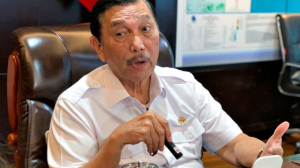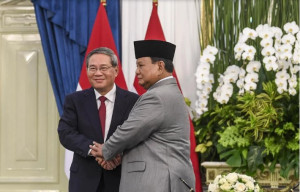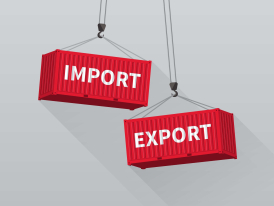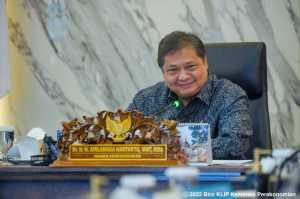Govt, economists confident on RI’s economic resilience amidst global uncertainty
Indonesia’s economy remains resilient despite global uncertainties fueled by shifting geopolitical dynamics and U.S. trade tariff policies, which have disrupted the global trade environment.
"Our Third Party Funds (DPK) is above 5 percent and credit distribution is above 10.42 percent. Our banking liquidity is maintained, with the loan to deficit ratio is good at 88.92 percent. We also see the capital adequacy ratio at 27 percent. So actually our banking is solid in the current period," Airlanggaster for the Economy, Airlangga Hartarto, said while addressing an economic symposium presided by President Prabowo Subianto in Jakarta on Tuesday, April 8, 2025.
Chairman of the National Economic Council (DEN), Luhut Binsar Pandjaitan, said that the Indonesian government should not be overly concerned about the reciprocal tariffs imposed by U.S. President Donald Trump on dozens of countries, including Indonesia.
According to DEN’s calculations, the U.S. policy will not directly impact Indonesia's domestic economy, making the effects relatively limited.
"We see that Indonesia's export portion relative to GDP is relatively low, around 23.8 percent, and exports to America only account for 10 percent of Indonesia's total exports," Luhut told the symposium.
Rather than facing direct pressure, Luhut believes Indonesia's economy will be more affected by the global trade war resulting from Trump's reciprocal tariff policy.
"DEN has conducted simulations, and Indonesia's economy will experience pressure due to the contraction impact and global trade volume decline caused by the U.S. tariffs and retaliations from several other countries such as China, Japan, and the European Union," he said.
Furthermore, he emphasized that Indonesia has significant experience in handling major global economic crises, such as the COVID-19 pandemic. For this reason, he reassured that while vigilance is necessary, excessive worry is unwarranted.
Chairman of the Board of Commissioners of the Indonesia Deposit Insurance Corporation (LPS), Purbaya Yudhi Sadewa, asserted that Indonesia's economy is currently on a positive trend. Based on the leading economic index developed by LPS, the national economy is projected to continue growing over the next 6 to 12 months.
“This is Indonesia's economic crystal ball. It is usually never wrong,” Purbaya told the synposium.
He said further that Indonesia's economy is expanding after experiencing severe pressure in 2020. “This means that from March until next year, our economy will continue to expand,” he said.
Meanwhile, Minister of Finance Sri Mulyani Indrawati highlighted that Indonesia must adapt to these changes while maintaining a strong state budget (APBN) as a key tool for economic stability.
“The trade tariffs imposed by the United States, particularly on countries like China, Canada, and Mexico, have reshaped global trade dynamics and led to retaliatory measures from affected nations. The tariffs have created significant uncertainty, as the global trade system weakens and multilateral trade rules become less reliable. In this environment, Indonesia faces challenges but also opportunities,“ Sri Mulyani said in her remarks at the synposium.
She emphasized that Indonesia’s flexible and adaptive trade policies would be essential in countering the effects of these tariffs. Moreover, with countries such as Vietnam, Bangladesh, and Thailand facing higher tariffs than Indonesia, there is potential for Indonesia to capture market share from those nations, enhancing trade and investment opportunities.
State budget and economic resilience
Despite the global trade disruptions, Indonesia’s economic fundamentals remain strong. Key indicators such as manufacturing output, trade balance, and export diversification suggest that the country is poised to weather global economic challenges.
Sri Mulyani highlighted that the State Budget (APBN) plays a crucial role in stabilizing the economy. As of March, the APBN remains in a good position, with improvements in tax revenue despite challenges. The government has implemented several reforms to improve tax efficiency and reduce tariff burdens, which contribute to the economy's overall resilience.
She reassured that the government will continue to ensure that state spending is well-targeted, especially in areas such as energy subsidies, fertilizer assistance, and social aid, further stabilizing the economy.
Indonesia should not “feel pressured”
Despite being the second-largest export destination, Indonesia is not overly reliant on the United States for trade, and should not feel pressured or "submissive" in tariff negotiations with Washington, said Muhammad Andri Perdana, an economist at the Center for Economic and Law Studies (Celios).
He emphasized that although the U.S. is a major trading partner, the gap between the U.S. and Indonesia's largest trading partner is substantial. Moreover, the difference between the U.S. and other countries in Indonesia's trade network is not significant, suggesting that the U.S.'s position is not overwhelmingly critical in comparison to other trade relationships.
Andri pointed out that Indonesia has a diverse range of trade partners and still has plenty of opportunities to expand these relationships.
“If we look at Indonesia's trade map, there are numerous alternatives. Indonesia’s trade partners can still be diversified more broadly, meaning that the country’s dependence on the U.S. is not as large as some might think,” he said.
According to Andri, the current trade dispute and the threat of U.S. tariffs should not be seen as a setback but rather as an opportunity for Indonesia to strengthen partnerships with other countries affected by the ongoing trade war.
“The government must show its diplomatic skill in fostering new partnerships with other nations facing similar challenges in the trade conflict,” he added.
Already have an account? Sign In
-
Start reading
Freemium
-
Monthly Subscription
20% OFF$29.75
$37.19/MonthCancel anytime
This offer is open to all new subscribers!
Subscribe now -
Yearly Subscription
33% OFF$228.13
$340.5/YearCancel anytime
This offer is open to all new subscribers!
Subscribe now







